Julia Buckley's Blog, page 7
April 26, 2014
SYNDROME E Now Out in Paperback
In light of the paperback release of SYNDROME E, I a book I greatly enjoyed, I thought I'd re-run the interview I did with its author, Frank Thilliez, last year.
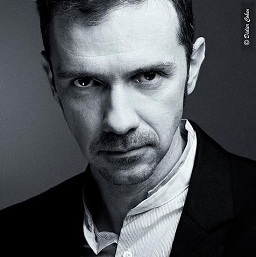 Franck Thilliez's new novel, SYNDROME E, is his first book available in an American translation. The movie rights have been sold to Paintbrush Films.
Franck Thilliez's new novel, SYNDROME E, is his first book available in an American translation. The movie rights have been sold to Paintbrush Films.
Franck, thanks so much for discussing your book with me.
This novel introduced many themes: neuroscience, police work, schizophrenia, parent-child relationships, a computer-oriented world, violent video games, film technology, and subliminal suggestion, to name a few. Do you start a novel knowing all the themes you would like to discuss, or does your research and writing lead you to more and more complicated plots?
Yes, I know, in a general way, the main topics I’ll talk about. Concerning Syndrome E, I wanted to talk about all themes concerning pictures and the impact they have on our brain. So, it concerned movies, video games, subliminal pictures, brain studies… But you’re right: the more I researched, the more I discovered plots that I could talk about, like neuromarketing or the way a movie is made. So, I naturally included them in my story.
Lucie Hennebelle is a single mother of twins; she is also a career cop. This sounds like an almost impossible combination. Do you think that cops, male and female, spend a lot of time feeling guilty about their family obligations?
I know a few cops and I often talk with them about their job. They are people really involved in their work, they like what they’re doing and are proud of it. When you work in the violent crime department, here in France, you can’t say: “I go to work at 8 am and come back home at 5 pm,” because it does not depend on you, but on murderers! If you work on a big case, it will take all your time, day and night, because, you know, the 2 or 3 first days after a crime is committed are the most important: you can’t lose a minute. So, you’ll not be at home, near your family, and your work will consume you. But, most of time, they do not feel guilty, because this job is a part of their life, as much important as their children. It’s not easy to be the wife of a cop (or the husband of a female cop), because, adding to that, this could be a dangerous job…
Someone in the novel suffers from hysterical blindness. I’d heard the term before, but had never really seen it applied to a situation. How common is this condition? How did you research it?
It’s an amazing condition. I heard about it when I talked with a psychiatrist. He said to me: “One day, I treated a woman who did not hear her husband when he talked to her. She heard her children, but she couldn’t hear him! This is what we call hysterical deafness. She’s not really deaf, but her brain makes her believe she is… ” It was amazing. By doing research, I discovered that there were all sorts of such hysterical problems: people thinking they’ve lost a leg or arm, people thinking they’re blind… All those conditions have a psychological explanation and can be solved.
Franck Sharko is a great name for a detective. Did he become Sharko because he is predatory to the bad guys? Or did you have other reasons for giving him this name? (And is there a reason that you share a Christian name?)
Here, in France, most readers ask me : “Why did you call your detective Sharko ?” It’s great that you are American, because you immediately see that in Sharko, there is the English word “Shark." Shark, because Franck Sharko never abandons, he’s really a hunter of killers and will work and work until he catches them! And for the first name, Franck, the same as mine: I just wanted “Franck Sharko” to sound hard, like German. Because he’s a hard guy!
One of the many facts that stood out for me was a film expert’s claim that François Mitterand attempted, in 1988, to subliminally influence voters by splicing his image into the credits of the evening news. How did he achieve this? Did he pay off a producer?
In France, the “Chanel 2” is a public channel, so it belongs to the French State. A president can choose the head of the channel, and he can decide to squelch publicity, … I don’t know how it really happened with François Mitterand, but because he was president since 1980 he had the power to put a subliminal image of himself on the evening news a few weeks before the election of 1988 to re-elect him! You must also know that during this period, there were no laws that forbade someone to use subliminal images in films or advertising…
Wow! How worried should we be, in 2012, that we are being manipulated through the medium of film or things that we see on computer and television screens?
As I say in the book, we must protect our children, who are always watching violent pictures, in video games, on Internet or television. Most of them (under 7 years old) can’t distinguish reality from fiction. With the new technologies (phones, i-pads, Internet), times are changing; now our sons and daughters are growing up with violent pictures around them.
In extreme cases, we can perhaps see the consequence of this in the news: look what happened in Norway with Behring Breivik, look at the different massacres in schools over the last years, or the awful killing in the cinema during the broadcast of Batman, a few days ago. Some killers even try to post their acts on the Internet.
So, I don’t think we are manipulated, I just want to tell people: be careful of all those screen broadcasted pictures; they could be dangerous…
Are you an old film buff yourself? Do you collect films?
When I was 15 years old, and for many years later, I used to watch all horror/thriller/suspense films that would be broadcast on TV! Sometimes, films were broadcast late in the night, and I remember going to bed and setting my alarm clock to wake me up just before the beginning of the film. It was also the period I was a member of a small video club, near my house, so I could rent of all the tapes I wanted. I used to collect video tapes, and then DVDs, but I sold most of them when I grew up, because I needed money! I always loved Hitchcock’s films, Dario Argento, Andrew Romero, David Cronenberg; and nowadays, David Fincher, Christopher Nolan or Ridley Scott are some of my favorite directors.
You must have loved Inception. :)
Your description of Egypt, through Sharko’s eyes, is not flattering—it talked me out of ever visiting Egypt. Have you travelled there?
Talking about the Egypt in tour guides with the Pyramids, Sphinx, nice places in Cairo was not interesting me. A crime novel must be more than a diversion; it must inform readers of the reality of our world. So, I wanted to show the country as it really is. Most of people there are poor; they have difficulties surviving and they live in awful conditions. There are more than 8 shantytowns at the border of the Cairo, containing thousands and thousands of people. I say in the book that the police and government are corrupt. Revolution exploded in Egypt only a few months after the publication of Syndrome E in France, and I proves that I was not completely wrong…
And no, I never travelled there, but did a lot of research on this country, watching Egyptian films, reading books, talking by email with people there.
A small story : I tried to be in contact with the police there, just to ask single things, like “how are you clothed?” or “what are the grades in your police?,” but they never answered, they said top secret!
At one point Lily and Sharko feast on Kentucky Fried Chicken. Is this American chain popular in France?
It’s starting to gain popularity, but it’s not as popular as McDonalds!
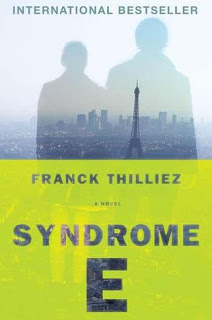 Ah, the ubiquitous McDonalds! :)
Ah, the ubiquitous McDonalds! :)
There are many airplane journeys in the novel—Sharko finds them wearying, almost existential experiences—and yet they retain a certain glamour for the reader, linking the characters to far-flung locales. What’s your attitude toward airplane travel? Do you enjoy it?
In the last two years, I travelled a lot because of the publication of my books in many countries. I really like airplane travel. I love being in an airport, seeing people going abroad, and others coming back home. An airport is a particular place where you can touch the world. I read a lot during my travels, and sometimes I write. The most difficult is, of course, the jet lag, but it’s such a good thing to discover new countries and people.
Great point! On to Lucie Henebelle. Lucie is compared, by one character, to Jodie Foster. Are you a Jodie Foster fan? Did you see Lucie Henebelle as sort of similar to Foster’s Clarice Starling? Or do you just like Foster’s combination of toughness and femininity?
I’m absolutely a fan of Jodie Foster! She’s a great actor and she would be perfect for Lucie, the main character of my book, if she were slightly younger. When I created Lucie a few years ago, I had in mind Jodie Foster as she was in The Silence of the Lambs, one of my favorite films.
Who are your literary influences? What are you reading now?
I started by reading Agatha Christie, Arthur Conan Doyle, and classical Anglo-Saxon crime novels. Then I had my period of Stephen King (and still do). He’s a great writer. I spent night after night reading his books, trying to guess how he could frighten us so much. During my studies, I did not read a lot (but was watching films!). I started reading crime novels again 10 years ago. Nowadays, I read Dennis Lehane, Michael Connelly, but also books by John Steinbeck.
If I could make only one journey to France, where should I be sure to go?
Everywhere ! France is a beautiful country, with many cultures, great landscape, big towns but also very quaint villages, where the time has stood still. French food and wine are excellent; just spend time in a little restaurant of Paris or by the sea at Deauville or Cannes!
Sounds lovely! Thank you so much for a terrific read and for answering these questions.
You’re welcome. It was a pleasure.

 Franck Thilliez's new novel, SYNDROME E, is his first book available in an American translation. The movie rights have been sold to Paintbrush Films.
Franck Thilliez's new novel, SYNDROME E, is his first book available in an American translation. The movie rights have been sold to Paintbrush Films.
Franck, thanks so much for discussing your book with me.
This novel introduced many themes: neuroscience, police work, schizophrenia, parent-child relationships, a computer-oriented world, violent video games, film technology, and subliminal suggestion, to name a few. Do you start a novel knowing all the themes you would like to discuss, or does your research and writing lead you to more and more complicated plots?
Yes, I know, in a general way, the main topics I’ll talk about. Concerning Syndrome E, I wanted to talk about all themes concerning pictures and the impact they have on our brain. So, it concerned movies, video games, subliminal pictures, brain studies… But you’re right: the more I researched, the more I discovered plots that I could talk about, like neuromarketing or the way a movie is made. So, I naturally included them in my story.
Lucie Hennebelle is a single mother of twins; she is also a career cop. This sounds like an almost impossible combination. Do you think that cops, male and female, spend a lot of time feeling guilty about their family obligations?
I know a few cops and I often talk with them about their job. They are people really involved in their work, they like what they’re doing and are proud of it. When you work in the violent crime department, here in France, you can’t say: “I go to work at 8 am and come back home at 5 pm,” because it does not depend on you, but on murderers! If you work on a big case, it will take all your time, day and night, because, you know, the 2 or 3 first days after a crime is committed are the most important: you can’t lose a minute. So, you’ll not be at home, near your family, and your work will consume you. But, most of time, they do not feel guilty, because this job is a part of their life, as much important as their children. It’s not easy to be the wife of a cop (or the husband of a female cop), because, adding to that, this could be a dangerous job…
Someone in the novel suffers from hysterical blindness. I’d heard the term before, but had never really seen it applied to a situation. How common is this condition? How did you research it?
It’s an amazing condition. I heard about it when I talked with a psychiatrist. He said to me: “One day, I treated a woman who did not hear her husband when he talked to her. She heard her children, but she couldn’t hear him! This is what we call hysterical deafness. She’s not really deaf, but her brain makes her believe she is… ” It was amazing. By doing research, I discovered that there were all sorts of such hysterical problems: people thinking they’ve lost a leg or arm, people thinking they’re blind… All those conditions have a psychological explanation and can be solved.
Franck Sharko is a great name for a detective. Did he become Sharko because he is predatory to the bad guys? Or did you have other reasons for giving him this name? (And is there a reason that you share a Christian name?)
Here, in France, most readers ask me : “Why did you call your detective Sharko ?” It’s great that you are American, because you immediately see that in Sharko, there is the English word “Shark." Shark, because Franck Sharko never abandons, he’s really a hunter of killers and will work and work until he catches them! And for the first name, Franck, the same as mine: I just wanted “Franck Sharko” to sound hard, like German. Because he’s a hard guy!
One of the many facts that stood out for me was a film expert’s claim that François Mitterand attempted, in 1988, to subliminally influence voters by splicing his image into the credits of the evening news. How did he achieve this? Did he pay off a producer?
In France, the “Chanel 2” is a public channel, so it belongs to the French State. A president can choose the head of the channel, and he can decide to squelch publicity, … I don’t know how it really happened with François Mitterand, but because he was president since 1980 he had the power to put a subliminal image of himself on the evening news a few weeks before the election of 1988 to re-elect him! You must also know that during this period, there were no laws that forbade someone to use subliminal images in films or advertising…
Wow! How worried should we be, in 2012, that we are being manipulated through the medium of film or things that we see on computer and television screens?
As I say in the book, we must protect our children, who are always watching violent pictures, in video games, on Internet or television. Most of them (under 7 years old) can’t distinguish reality from fiction. With the new technologies (phones, i-pads, Internet), times are changing; now our sons and daughters are growing up with violent pictures around them.
In extreme cases, we can perhaps see the consequence of this in the news: look what happened in Norway with Behring Breivik, look at the different massacres in schools over the last years, or the awful killing in the cinema during the broadcast of Batman, a few days ago. Some killers even try to post their acts on the Internet.
So, I don’t think we are manipulated, I just want to tell people: be careful of all those screen broadcasted pictures; they could be dangerous…
Are you an old film buff yourself? Do you collect films?
When I was 15 years old, and for many years later, I used to watch all horror/thriller/suspense films that would be broadcast on TV! Sometimes, films were broadcast late in the night, and I remember going to bed and setting my alarm clock to wake me up just before the beginning of the film. It was also the period I was a member of a small video club, near my house, so I could rent of all the tapes I wanted. I used to collect video tapes, and then DVDs, but I sold most of them when I grew up, because I needed money! I always loved Hitchcock’s films, Dario Argento, Andrew Romero, David Cronenberg; and nowadays, David Fincher, Christopher Nolan or Ridley Scott are some of my favorite directors.
You must have loved Inception. :)
Your description of Egypt, through Sharko’s eyes, is not flattering—it talked me out of ever visiting Egypt. Have you travelled there?
Talking about the Egypt in tour guides with the Pyramids, Sphinx, nice places in Cairo was not interesting me. A crime novel must be more than a diversion; it must inform readers of the reality of our world. So, I wanted to show the country as it really is. Most of people there are poor; they have difficulties surviving and they live in awful conditions. There are more than 8 shantytowns at the border of the Cairo, containing thousands and thousands of people. I say in the book that the police and government are corrupt. Revolution exploded in Egypt only a few months after the publication of Syndrome E in France, and I proves that I was not completely wrong…
And no, I never travelled there, but did a lot of research on this country, watching Egyptian films, reading books, talking by email with people there.
A small story : I tried to be in contact with the police there, just to ask single things, like “how are you clothed?” or “what are the grades in your police?,” but they never answered, they said top secret!
At one point Lily and Sharko feast on Kentucky Fried Chicken. Is this American chain popular in France?
It’s starting to gain popularity, but it’s not as popular as McDonalds!
 Ah, the ubiquitous McDonalds! :)
Ah, the ubiquitous McDonalds! :)There are many airplane journeys in the novel—Sharko finds them wearying, almost existential experiences—and yet they retain a certain glamour for the reader, linking the characters to far-flung locales. What’s your attitude toward airplane travel? Do you enjoy it?
In the last two years, I travelled a lot because of the publication of my books in many countries. I really like airplane travel. I love being in an airport, seeing people going abroad, and others coming back home. An airport is a particular place where you can touch the world. I read a lot during my travels, and sometimes I write. The most difficult is, of course, the jet lag, but it’s such a good thing to discover new countries and people.
Great point! On to Lucie Henebelle. Lucie is compared, by one character, to Jodie Foster. Are you a Jodie Foster fan? Did you see Lucie Henebelle as sort of similar to Foster’s Clarice Starling? Or do you just like Foster’s combination of toughness and femininity?
I’m absolutely a fan of Jodie Foster! She’s a great actor and she would be perfect for Lucie, the main character of my book, if she were slightly younger. When I created Lucie a few years ago, I had in mind Jodie Foster as she was in The Silence of the Lambs, one of my favorite films.
Who are your literary influences? What are you reading now?
I started by reading Agatha Christie, Arthur Conan Doyle, and classical Anglo-Saxon crime novels. Then I had my period of Stephen King (and still do). He’s a great writer. I spent night after night reading his books, trying to guess how he could frighten us so much. During my studies, I did not read a lot (but was watching films!). I started reading crime novels again 10 years ago. Nowadays, I read Dennis Lehane, Michael Connelly, but also books by John Steinbeck.
If I could make only one journey to France, where should I be sure to go?
Everywhere ! France is a beautiful country, with many cultures, great landscape, big towns but also very quaint villages, where the time has stood still. French food and wine are excellent; just spend time in a little restaurant of Paris or by the sea at Deauville or Cannes!
Sounds lovely! Thank you so much for a terrific read and for answering these questions.
You’re welcome. It was a pleasure.

Published on April 26, 2014 12:02
April 15, 2014
A Wonderful Re-Issue of TIME AND AGAIN
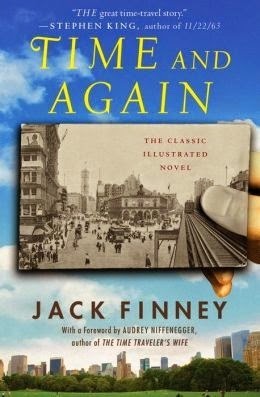 I am thrilled to see this re-issue of TIME AND AGAIN, Jack Finney's terrific 1970 time-travel novel in which a New York artist travels to the city in 1882. My friend Jim lent me the book in the 1990s and said that I would enjoy it. I did like
I am thrilled to see this re-issue of TIME AND AGAIN, Jack Finney's terrific 1970 time-travel novel in which a New York artist travels to the city in 1882. My friend Jim lent me the book in the 1990s and said that I would enjoy it. I did likethe story, which is adventurous, romantic, and nostalgic. But beyond that, the tale had that ineffable something that made me never forget it--neither the title nor the author--and I've recommended it to many people myself in the years since I first read it.
Now Touchstone has released an updated version with "digitally restored art, a completely redesigned interior, and an all-new foreword by Audrey Niffenegger."
I was lucky enough to snag a copy of the new version, and I'm enjoying it greatly, especially the photographs of New York which Finney uses as the basis of his story. Every old photograph creates a sense of nostalgia for a time we never knew, and there is a certain associated sadness with the necessary separation of our reality and that image. Finney erases the separation with his bold tale of a man who walks into the past.

Published on April 15, 2014 16:27
April 6, 2014
Giving New Life to Great Fiction
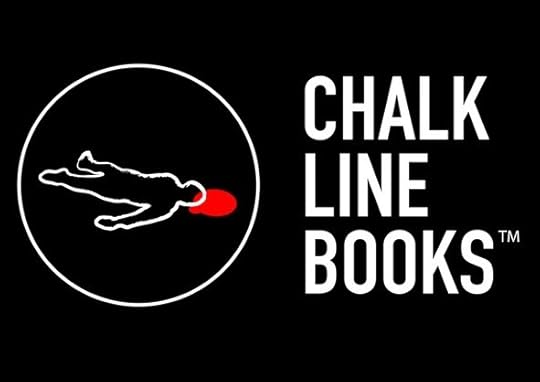 I just became aware of Chalk Line Books, a new imprint created by the Devault-Graves Agency, the goal of which is to re-publish, in e-book form, the great books of the past.
I just became aware of Chalk Line Books, a new imprint created by the Devault-Graves Agency, the goal of which is to re-publish, in e-book form, the great books of the past.As they say on the website:
"We started with two of the best—Jim Thompson and David Goodis. We hope you will join us as we add more authors such as Charles Williams, Ed McBain, Peter Rabe and many others to our roster. If you recognize the importance of Black Lizard Books, a company that is no longer publishing, in republishing these authors, then you will understand what we hope to accomplish."
I'm always for the idea of re-discovering great writing that has potentially fallen by the wayside. Let's hope Chalk Line is able to build a new readership for authors who deserve it.
And Chalk Line? How about some great mysteries by women? You can start with Margaret Millar and Patricia Wentworth.

Published on April 06, 2014 13:31
February 16, 2014
Two Great Reads Culled From The TBR Pile
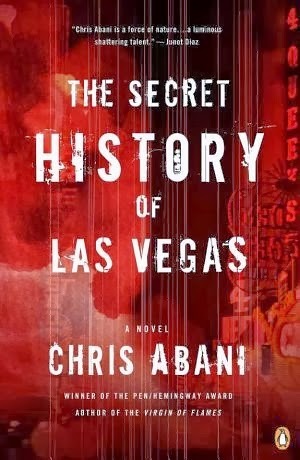 I am lucky enough to receive many books from publishers; lately I haven't found time to read many of them, but two stand out in my recent reading.
I am lucky enough to receive many books from publishers; lately I haven't found time to read many of them, but two stand out in my recent reading.First, Chris Abani's The Secret History of Las Vegas. I'm surprised I haven't heard of Abani before; his style is literary and accomplished, and he wrote five books before this one, in addition to volumes of poetry. The book reads less like a mystery and more like a novel, but it's a compelling book with Steinbeck-like dialogue and fascinating internal monologues.
His characters, too, are distinctive. First, there is Salazar the detective, who hopes to pin some unsolved murders on a pair of conjoined twins. He enlists the help of Sunil Singh, a South African immigrant who is haunted by the Apartheid years and his own distinct memories. Singh is well-versed in the behavior of psychopaths, and is expected to diagnose the twins as such.
Most memorable, though, are the conjoined twins, named Fire and Water. Their very existence raises questions about the culpability of government and society when children are born with anomalies related to their environment. Fire and Water have been considered freaks all of their lives, but this gives them a distinct view of the world, and of the people who view them with immediate judgment.
Abani's writing, literary and graceful, immerses the reader in his Las Vegas setting--a perfect place to encompass the variations of humanity that pass through this paradoxical city.
Another great read is Elisabeth Elo's North of Boston. In it, she introduces a nuanced, spunky narrator named Pirio Kasparov, an independent woman who recognizes her dualities, smiling wryly at her shortcomings even as she accomplishes feats of valor and detection.
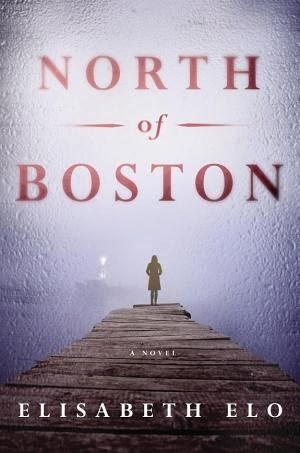
Pirio loses a friend to a boating accident in Boston, but she soon becomes convinced that his death was not accidental, and she begins to look into it. Like Abani, Elo writes seamless prose, poetic and compelling, and her dialogue is memorable, especially when Pirio is talking with her godson, a vulnerable boy who has faced more than his share of conflict.
Pirio is both tragic and funny, and I was worried about her for almost the whole novel, despite the fact that she is very strong and has been scientifically proven to be able to withstand extremes better than just about anyone. Still, she is almost foolishly brave, and my only complaint about the novel is that sometimes Pirio got into situations that I couldn't believe anyone--even she--would be willing to endure.
Both books were a pleasure to read, and I look forward to more from these accomplished authors.

Published on February 16, 2014 15:31
January 28, 2014
"Ice is Just as Great, and Would Suffice"

Frost seemed to predict the climate change debate when he wrote "Fire and Ice." Certainly this winter is making the ice theory seem plausible, except that those with an imagination (and a memory) will recall that the summer temperatures were just as extreme in the other direction, and are likely to be again, accompanied by storms of record intensity. This is the new age of weather.
I just sat holed up for two "snow days" which were really "negative temperatures days." I got to read books and write them, and I was lucky enough to be able to do it in a heated house. I found myself wondering how people (and animals) survive in this brutal weather.
But here are the things that I am most grateful for, after this last weekend in Chicago:
--flannel sheets
--a warm body next to me in bed (my husband)
--goosedown comforters
--safe space heaters
--our working furnace
--emergency workers who help people trapped in the cold
--tea and hot chocolate
--Carmex and Chapstick
--pets who found cozy corners to keep them warm (in the case of our tiny female cat, that place is right in front of the bathroom heat vent--warmest room in the house!)
Keep warm, everyone. This too shall pass.

Published on January 28, 2014 18:00
November 26, 2013
Making the Holiday Reading List
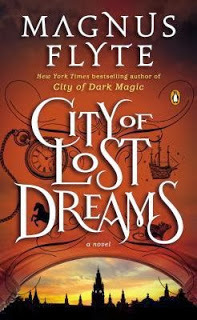 I'm not normally a reader of historical mysteries, but CITY OF LOST DREAMS, the new book by Magnus Flyte, seems to be much more than that--it is whimsey and fantasy in a historical setting, according to Kirkus, who called it "a lively, amusing romantic mystery," while CNN dubbed it "one of the most original novels released this year."
I'm not normally a reader of historical mysteries, but CITY OF LOST DREAMS, the new book by Magnus Flyte, seems to be much more than that--it is whimsey and fantasy in a historical setting, according to Kirkus, who called it "a lively, amusing romantic mystery," while CNN dubbed it "one of the most original novels released this year."You had me at romantic, actually, but I always like to read something fresh and lively, and this book seems to be just the ticket for my holiday reading.
There is, apparently, a first book, called CITY OF DARK MAGIC, but I think I'm going to start with number two and see if it strikes my fancy. I can always go back and read the other book by the mysterious Mr. Flyte.

Published on November 26, 2013 15:26
September 16, 2013
Gearing up for Autumn

Fall is almost here, and the weather in Chicago is aready crisp and cool. This is the time for long walks, hot soup, sweatshirts, and extra covers on the bed--with the windows open!!
What's your favorite thing about autumn?

Published on September 16, 2013 15:22
September 2, 2013
Happy Labor Day
Published on September 02, 2013 09:58
July 28, 2013
Barbara Rogan on Writers, Agents, Editors, and Her New Mystery
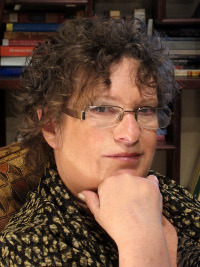 Hello, Barbara! I enjoyed reading your new mystery, A DANGEROUS FICTION, and once I got about halfway through I really couldn’t put it down until I finished it! Thanks for agreeing to chat about it.
Hello, Barbara! I enjoyed reading your new mystery, A DANGEROUS FICTION, and once I got about halfway through I really couldn’t put it down until I finished it! Thanks for agreeing to chat about it.Let’s begin with the title: it’s a clever one, referring both to the publishing business, in which the main character works, and the heroine’s tendency to embellish her history. What came to you first: the title, or the plot?
I'm glad you enjoyed the book. I agree, it is a very apt title; but as usual with my books, I didn’t come up with it. It was the brainchild of my editor at Viking. While I was writing the book, I was calling it “Can You Hear Me Now?” which I quite liked; but “A Dangerous Fiction” really nailed the novel and I loved it as soon as I heard it.
Your main character, Jo, is tough, yet vulnerable, and she goes through a lot in this novel, both personally and professionally. Is she utterly fictional, or is she an amalgam of agents you have known?
I subscribe to the great Ivy Compton-Burnett’s take on creating fictional characters. “People in life hardly seem definite enough to appear in print,” she once said. “They are not good or bad enough, or clever or stupid enough, or comic or pitiful enough.” I drew from my own experience and that of my friends in the industry to write this book, but Jo Donovan, the character, was who she needed to be for the story.
The book offers us an inside look at a successful literary agency and some of the work that is done inside. I was shocked by the uncertainty of it: the fear of colleagues who might bear grudges, of media that might affect the agency’s reputation, of clients that might leave, seeking greener pastures. Is agenting, indeed, not for the faint of heart?
Publishing in general is not for the faint of heart, whether you’re an editor, agent, or writer. When I first started my agency, there were times that I had to worry about putting food on the table. But most people who work in that field do it because they love books and writing, and both agents and editors take great pride in their writers' work.
The cop in the novel, NYPD Detective Tommy Cullen, is an attractive man. He reminded me of Joseph Cotton’s character in Dial M for Murder. Do you happen to like that Hitchcock flick?
I do, though I haven’t seen it in ages. In the back of my mind, though, as I wrote A DANGEROUS FICTION, I was hearing dialogue from those classic Thin Man movies and Dorothy Parker’s stories.
Cool!! Jo’s past is littered with memories she doesn’t want to confront: the deaths of her parents; the abuses perpetrated by her grandmother; the marriage she insists was perfect. Why would someone as brilliant as Jo be so limited in analyzing her own experience?
Because it worked for her to compartmentalize her life, instead of integrating all its disparate parts. That integration is part of the journey she’s on, and one of the reasons I feel compelled to write more about Jo. But don’t we all tweak bits of our lives to make it a better story? Fiction is so much tidier than real life: more reason, less chance.
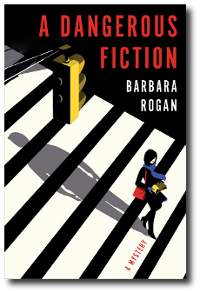 I was particularly fond of a character named Mingus, who happened to be a dog. Is Mingus based on any German Shepherds you have known?
I was particularly fond of a character named Mingus, who happened to be a dog. Is Mingus based on any German Shepherds you have known?
All of them. So glad you liked Mingus! A good German shepherd is pretty much the ideal dog for me. Except for the shedding.
Jo has quite a few men in her corner. Are they protective of her because she is vulnerable, or do they naturally want to help a beautiful damsel in distress?
She has women in her corner, too. And she’s pretty tough; I don’t see her playing the helpless woman card.
While we’re on the subject of beauty—you have quite a few truly beautiful characters. Two gorgeous young interns, a beautiful protagonist, and a former lover whose nickname was “Prom King.” Do you think audiences are more sympathetic to beautiful people—even fictional ones?
Subconsciously they may be. Studies have shown that in real life attractive people have a pronounced advantage; it’s not unlikely that that carries over to fiction. But I’d like to think there are functional reasons my characters look the way they do. Certainly it’s true in Jo’s case, because she’s used her looks, along with brains and determination, to make her way in the world.
You once ran a literary agency in Israel. What are the notable differences between agenting in Israel and agenting in New York?
New York is tougher, because it’s never one person who decides to buy a book, a number of people have to weigh in, and any one of them can veto it along the way. In Israel, editors seemed to have more autonomy. But I haven’t been an agent in many years, and things may have changed.
You once met Madeline L’Engle. What was she like? How did you happen to meet?
I represented her U.S. agent, Theron Raines, for Hebrew rights, which meant I handled her books among others. I took the opportunity of introducing myself, because I pretty much worshiped her. She was my favorite writer as a kid, and I still remember the experience of reading A WRINKLE IN TIME one day when I was 8 or 9 and thinking, for the first time, that I wanted to do this; I wanted to make up stories and write books. We met a few times at the Cathedral of St. John the Divine, had lunch and talked about books and writing. When my second novel, CAFÉ NEVO, was published, she wrote that it was “a wonderful novel with richly developed characters acting and interacting… the café and its clients will long remain in memory.” What was she like? Some writers put the best of themselves into their work and don’t have much left over. Madeleine L’Engle was as kind and gracious as she was gifted.
I always got that vibe from her dust jacket photo--it's nice to know it was true. What are you reading now?
Ruth Rendell’s THE ST. ZITA SOCIETY and Elizabeth Strout’s THE BURGESS BROTHERS.
Are you writing another mystery?
I’m currently writing the second of what will be at least two more Jo Donovan mysteries. She interests me strangely.
Awesome! You’ve done it all in publishing: agenting, writing, teaching, leading seminars. What advice do you give writers that they seem to find the most helpful?
I also teach writing, at my online school www.nextlevelworkshop.com, so I am a fount of advice. Very generally, I advise writers to work on the craft and not to rush a story into print just because it’s so easy to do in the era of easy self-publishing. Novels are complicated; they take time and multiple drafts to fully emerge.
You’ve traveled many places; is there a place on Earth that you’d love to visit but have not yet done so?
Kenya and South Africa. I want to do a safari, though preferably one with comfortable beds and no bugs.
Which of the places you’ve visited was the most beautiful?
The west coast of Ireland; the Adriatic coast around Dubrovnik; parts of Switzerland; and Ein Gedi on the shore of the Dead Sea.
Thanks for chatting with me, Barbara!
My pleasure. Thank you for having me.
Find out more about Barbara Rogan on her website.

Published on July 28, 2013 23:00
July 26, 2013
Sarah Weinman Salutes the Women of Suspense
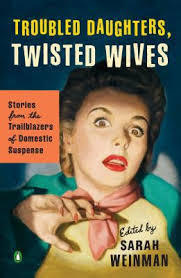 I was excited to receive this in the mail last week: Sarah Weinman's awesome compilation of suspense tales by women. As a life-long mystery fan, I recognized just about all of the names of the authors Weinman has selected, starting with Margaret Millar, one of my favorites from way back. I never felt Millar got the credit she deserved, perhaps because she was somehow seen as the writing spouse of Ross MacDonald, as though it was his profession and her hobby.
I was excited to receive this in the mail last week: Sarah Weinman's awesome compilation of suspense tales by women. As a life-long mystery fan, I recognized just about all of the names of the authors Weinman has selected, starting with Margaret Millar, one of my favorites from way back. I never felt Millar got the credit she deserved, perhaps because she was somehow seen as the writing spouse of Ross MacDonald, as though it was his profession and her hobby.I read Millar's story first, something reminiscent of a really good Twilight Zone episode and definitely a fun thing to read right before bed!
Other writers in the book include the great Charlotte Armstrong and Patricia Highsmith (author of The Talented Mr. Ripley).
For those who loved Shirley Jackson's "The Lottery" (which used to be in just about every grade school anthology, guaranteeing nightmares for generations of children), Weinman has provided a different Jackson tale, equally eerie and memorable.
It's so refreshing to see a book focused on the talented women in mystery fiction--the undersung writers whose accomplishments, if you read the biographies listed here, are multitudinous.
Hurrah! May more books like this be forthcoming.

Published on July 26, 2013 20:34




